|
|
|
Sort Order |
|
|
|
Items / Page
|
|
|
|
|
|
|
| Srl | Item |
| 1 |
ID:
138461
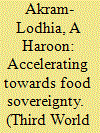

|
|
|
|
|
| Summary/Abstract |
Rural social movements and urban food activists have sought to build food sovereignty because it has the potential to be the foundation of an alternative food system, transcending the deep-seated social, economic and ecological contradictions of the global food economy.
However, continuing to build food sovereignty requires changes to global and local food systems that have to be undertaken in the messy reality of the present. This article therefore presents a series of wideranging, politically challenging but ultimately feasible interventions
that are necessary but not sufficient conditions for its realisation.
|
|
|
|
|
|
|
|
|
|
|
|
|
|
|
|
| 2 |
ID:
151503
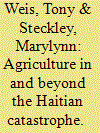

|
|
|
|
|
| Summary/Abstract |
Although the devastation from Haiti’s 2010 earthquake was concentrated in Port-au-Prince, it had deep agrarian roots. This paper situates Haiti’s urban poverty in the chronic exploitation of the country’s peasant classes as a basis for assessing the competing contemporary visions for agricultural development. We argue that the post-earthquake reconstruction has fortified a neoliberal development that is incompatible with the aspirations of the Haitian peasantry. Given the interrelated power of domestic elites and international donors, and the proliferation of disconnected development projects, we conclude that any prospect for pro-poor development hinges on the growth and collaboration of peasant movements.
|
|
|
|
|
|
|
|
|
|
|
|
|
|
|
|
| 3 |
ID:
155759
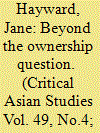

|
|
|
|
|
| Summary/Abstract |
A high-profile debate is taking place in China concerning the organization of agricultural land and production, with profound implications for China’s countryside. This debate is between those advocating for agricultural production to be taken over by large-scale agribusinesses, and those against this. Proponents regard agribusinesses as embodying modernity and progress, while those against forewarn of the channeling of profits out of peasant hands, the loss of peasants’ autonomy over labor and land, and the destruction of rural life. Recent English language publications on China’s agrarian change highlight the growing power of agribusiness and related processes of depeasantization, implying the Chinese debate on “who will till the land?” is futile. But this view obscures efforts by Chinese scholars and policymakers to promote forms of agricultural organization conducive to maintaining peasant livelihoods. By examining the Chinese debates on agribusinesses, family farms, and cooperatives, this article highlights points of contestation among policymakers and alternative possibilities, which may yet shape the course of China’s agrarian change. This article contributes to scholarship on China’s agrarian change, broader questions concerning depeasantization, and developmental possibilities under collective ownership.
|
|
|
|
|
|
|
|
|
|
|
|
|
|
|
|
| 4 |
ID:
148270
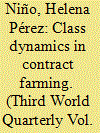

|
|
|
|
|
| Summary/Abstract |
This paper examines the class relations emerging in a contract farming scheme in Mozambique. Debates in the literature about contract farming characterise this market arrangement as leading to farmers losing control over production at the hands of capital. By discussing both the drivers and impacts of changes in the division of property and labour, this paper reveals a complex class structure in which the pressure of merchant capital on farmers is internalized within households and transferred onto workers and sharecroppers. This challenges the pertinence of conventional policy that prescribes empowering contract farmers without considering their varied class positions and interests.
|
|
|
|
|
|
|
|
|
|
|
|
|
|
|
|
| 5 |
ID:
162619
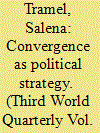

|
|
|
|
|
| Summary/Abstract |
Critical scholars and activists have now been contending with a widely recognised convergence of global crises for a decade. The issues have intersected decisively, with staple food sources proving inaccessible for the world’s poor, banks foreclosing on the most vulnerable, fuel sources causing war and impacting migration, and climate change-related instabilities shaking low-income communities to their core. At the same time, agrarian, environmental, indigenous and fishers’ movements – among others – have used this moment to converge in their own right. This article explores this intertwining of social justice movements with an eye on such interrelated challenges. Its overall objective is, on one side, to provide some broad empirical brushstrokes on the intertwining of transnational social justice movements at the local, national and regional scales as they work with and trade frameworks of food sovereignty and climate justice. On the flip side, this article offers a set of tools to analyse and understand the politics of convergence as political strategy – as a means of advancing global social justice – against the rising tide of climate-related resource grabs.
|
|
|
|
|
|
|
|
|
|
|
|
|
|
|
|
| 6 |
ID:
175103
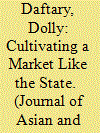

|
|
|
|
|
| Summary/Abstract |
Global policy organizations, financial institutions, and national governments have emphasized high-value agriculture in the world’s semi-arid areas inhabited by the greatest proportion of its poor, stressing linking households to markets to improve their well-being. This is assumed to involve state withdrawal and the ascendance of self-evident market forces. By means of ethnographic fieldwork in semi-arid western India, this paper discusses how the market does not arise spontaneously, but is deepened through state intensification. Rural households are imbricated with new markets by the state’s rendering of development policy market-driven, and through democratic decentralization, which has emerged as an instrument to facilitate the penetration of market actors into remote rural communities.
|
|
|
|
|
|
|
|
|
|
|
|
|
|
|
|
| 7 |
ID:
178384
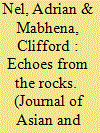

|
|
|
|
|
| Summary/Abstract |
This article seeks to characterise and contextualise land reform, and the experiences of resettled farmers, in the under-researched Matabeleland South. It does so through a historicised, landscape approach to changes in the post-Fast Track Land Reform Programme agrarian structure in two wards in Matobo District. While new land dispensation is still consolidating, outcomes are varied, and while beneficiaries are vulnerable to drought in mixed farming there is also notable resilience. Importantly, we argue that changes in the landscape ‘echo’ the past, where material and discursive changes play out at the same time as agrarian livelihoods evolve.
|
|
|
|
|
|
|
|
|
|
|
|
|
|
|
|
| 8 |
ID:
163056
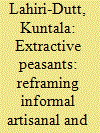

|
|
|
|
|
| Summary/Abstract |
This paper explores the ongoing reconfiguration of peasant labour processes from agriculture to informal mineral extraction, outlining the motivations of the rural poor in adopting mining and quarrying, and discusses how social sciences can best account for this significant shift towards extractive livelihoods. It argues that the ‘extractive peasants’ best explain the contemporary changes in rural, mineral-rich tracts throughout the Global South, and peasant mining practices are part of the informal economies. The extractive peasants return intellectual attention to practices that disrupt contemporary global mineral production and place the politics of the poor within broader debates on resource politics.
|
|
|
|
|
|
|
|
|
|
|
|
|
|
|
|
| 9 |
ID:
138458
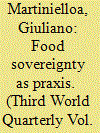

|
|
|
|
|
| Summary/Abstract |
This article critically reflects upon conceptual and analytical questions that affect the practical implementation of food sovereignty in Uganda, a country often labelled as the potential breadbasket of Africa. It proposes to look at the integration of food and land-based social relations in the context of localised and historical–geographical specificities of livelihood practices among Acholi peasants in northern Uganda as a way to ground the concept. It argues that many of the organising principles at the core of the food sovereignty paradigm are inscribed in the socio-cultural and ecological practices of peasant populations in northern Uganda. Yet these practices are taking place in an increasingly adverse national and international environment, and under circumstances transmitted from the past, which enormously challenge their implementation and jeopardise the future of food security and sovereignty prospects for peasant agriculture.
|
|
|
|
|
|
|
|
|
|
|
|
|
|
|
|
| 10 |
ID:
138456
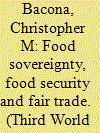

|
|
|
|
|
| Summary/Abstract |
The relationships among trade, food sovereignty and food security are underexplored. I conducted qualitative research with an influential cooperative to identify lessons that food sovereignty (FS) scholars could learn from fair trade and food security, and explore linkages among these projects. First, most co-op leaders and farmers view these projects as complementary, not contradictory. Second, state-led agrarian reforms and co-ops increase access to land, markets, water, forests and pasture, which have reduced – but not eliminated – seasonal hunger. Third, these diversified fair trade coffee-exporting smallholders could be part of a FS agenda. However, the split in fair trade suggests that only specific versions of fair trade are compatible with FS. Fourth, capable cooperatives can enhance fair trade and FS goals, and food security outcomes. Fifth, organised smallholders resisting the fair trade split could learn from the FS social movement’s strategies. Food insecurity remains a persistent challenge to both approaches.
|
|
|
|
|
|
|
|
|
|
|
|
|
|
|
|
| 11 |
ID:
181894
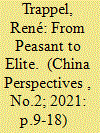

|
|
|
|
|
| Summary/Abstract |
This article contributes to the growing body of research on the role of the Party-state in shaping an emerging post-peasant modernity in rural China, taking developments in Gansu Province as a case. The article first analyses how a political preference for an agrarian elite has been put into recent policies and translates into rural practices. It argues that the “new-type agricultural management subjects,” (which form the core of this elite, should also be considered as a policy instrument designed to promote structural change in Chinese agriculture. This article proceeds to explore the capacity of the new agrarian elite as local development agents in Gansu Province. It focuses in particular on the legitimation of this instrument and its consequences for the structure of agriculture.
|
|
|
|
|
|
|
|
|
|
|
|
|
|
|
|
| 12 |
ID:
145131


|
|
|
|
|
| Summary/Abstract |
An important part of Beijing’s strategy to reduce the welfare gap between urban and rural parts of China has been the promotion of urbanisation. Replacing peasant agriculture with commercial operations of scale is an integral part of this endeavour. This article analyses the implementation of policies meant to transform the structure of Chinese agriculture. It argues that the central government is using a set of very flexible policies, project-based implementation and adaption to local conditions to guide and support an existing dynamic of structural transformation in agriculture. Local governments, in turn, appreciate the flexibility, the political predictability, the potential revenue improvements and the cognitive framework inherent in these programmes. The article is primarily based on interviews with leading cadres at the township and county levels in the provinces of Shandong, Sichuan and Guizhou between 2008 and 2010.
|
|
|
|
|
|
|
|
|
|
|
|
|
|
|
|
| 13 |
ID:
157709
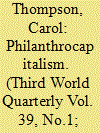

|
|
|
|
|
| Summary/Abstract |
Engaging the lively debates about the next expression of neoliberalism, this study suggests that it is evolving into philanthrocapitalism. After a brief discussion of the trajectories from neoliberalism, the article addresses the core ideology of philanthrocapitalism. The central thesis explores how philanthrocapitalism is moving beyond the requirement of ‘business practices’ for recipients of donor funds, into enforcing ‘business rule’ on to the public domain. Although philanthrocapitalism is most debated in the fields of health care and education, this article uses empirical analysis of international agricultural policies trying to enlist Southern Africa policies. It explores how philanthrocapitalist rule is reducing transparency, participation and deliberation within the public domain, well beyond requesting efficient business practices for greater food security. It concludes with how smallholder farmers are actively organising to resist business rule over their genetic resources and farming practices.
|
|
|
|
|
|
|
|
|
|
|
|
|
|
|
|
| 14 |
ID:
180271
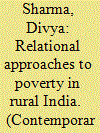

|
|
|
|
|
| Summary/Abstract |
Poverty is now widely recognised as multidimensional, with indicators including healthcare, housing and sanitation. Yet, relational approaches that foreground political-cultural processes remain marginalised in policy discourses. Focusing on India, we review a wide range of relational approaches to rural poverty. Beginning with early approaches that focus on structural reproduction of class, caste and to a lesser extent gender inequality, we examine new relational approaches developed in the last two decades. The new approaches examine diverse ways in which poverty is experienced and shapes mobilisations against deprivation. They draw attention to poor people’s own articulations of deprivation and alternate conceptions of well-being. They also show how intersecting inequalities of class, caste and gender shape governance practices and political movements. Despite these important contributions, the new relational approaches pay limited attention to technologies and ecologies in shaping the experience of poverty. Reviewing studies on the Green Revolution and wider agrarian transformations in India, we then sketch the outlines of a hybrid relational approach to poverty that combines socio-technical and -ecological dynamics. We argue that such an approach is crucial to challenge narrow economising discourses on poverty and to bridge the policy silos of poverty alleviation and (environmentally) sustainable development.
|
|
|
|
|
|
|
|
|
|
|
|
|
|
|
|
| 15 |
ID:
108493
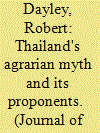

|
|
|
|
|
| Publication |
2011.
|
| Summary/Abstract |
Thailand's agrarian myth holds that culturally-based, small-scale subsistence farming is the most desirable form of community life for rural Thais. This article outlines Thailand's agrarian myth and argues that its current promotion finds support in an obsolete 'sufficiency ethic', rather than from the country's pragmatically-oriented farmers. Proponents of this myth come from Thailand's cultural and bureaucratic elite, urban intellectuals, and religious fundamentalists. Based on field research and secondary sources the article demonstrates how the attitudes and behaviors of contemporary Thai farmers belie the agrarian myth which non-farming elites now advocate. The article concludes that yellow-shirted proponents of Sufficiency Economy, Community Culture, and austere Buddhist fundamentalism should adjust their vision to the reality that Thailand's forward-looking farmers desire a rural lifestyle beyond the agrarian myth.
|
|
|
|
|
|
|
|
|
|
|
|
|
|
|
|
| 16 |
ID:
154793
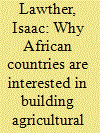

|
|
|
|
|
| Summary/Abstract |
Ten years ago, China and several African countries began to develop agricultural training centres, and opened the door for a cascade of optimism and pessimism on why China is interested in developing agricultural partnerships in Africa. Seldom has the appeal of such partnerships for African countries been explored, hence limiting our capacity to fully understand the dynamics of Sino–African agricultural relations. This article addresses the issue by examining why some African countries are interested in partnering with China in agricultural development. This article is based on 44 interviews that were conducted in 2015 at the Sino–African agricultural training centres in Rwanda and Uganda. I argue that Rwanda and Uganda seek to partner with China, as China can offer intermediary agricultural technologies that enable these respective countries to implement aspects of their domestic agricultural development plans. The article also provides reason to challenge the existing optimistic and pessimistic conventions about Sino–African agricultural affairs.
|
|
|
|
|
|
|
|
|
|
|
|
|
|
|
|
|
|
|
|
|